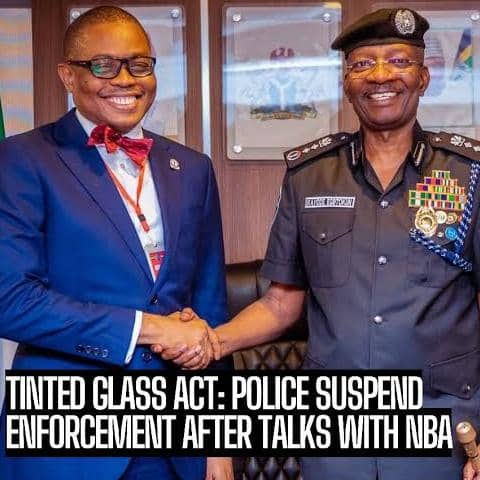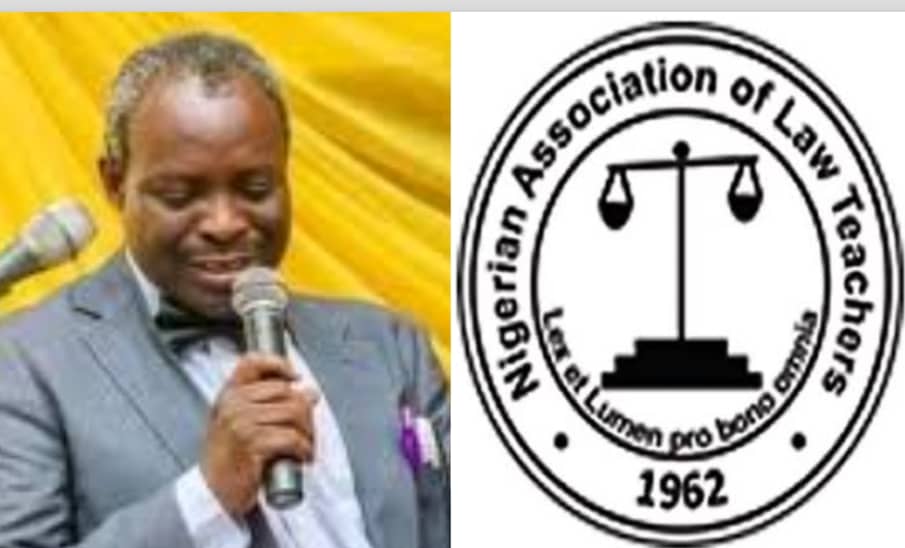CONSTRUCTIVE ENGAGEMENT OVER CONFRONTATION: LESSONS FROM THE RECENT NBA-NIGERIA POLICE DIALOGUE ON TINTED GLASS PERMIT ENFORCEMENT
By Sylvester Udemezue
On 8 October 2025, a development both symbolic and strategic unfolded in Abuja when the Inspector-General of Police (IGP), Dr. Kayode Adeolu Egbetokun, Ph.D., NPM, received a high-level delegation from the Nigerian Bar Association (NBA) led by its President, Afam Josiah Osigwe, SAN, at the Force Headquarters. The meeting centered on the enforcement of the Motor Vehicles (Prohibition of Tinted Glass) Act, 1991, and explored practical ways to strengthen cooperation between the Police and the Bar in promoting justice, accountability, and the rule of law. Following robust deliberations, the IGP acknowledged that although no court order currently restrains the enforcement of the Act, the Nigeria Police Force (NPF) (in deference to public interest and respect for the NBA) has temporarily suspended enforcement pending the hearing of a motion before the Federal High Court, Warri, slated for 16 October 2025. To institutionalize this new spirit of cooperation, the Police-NBA Joint Committee was inaugurated to enhance communication, coordination, and understanding between both institutions. The IGP urged motorists to use this window to regularize their vehicle documentation and reaffirmed the Force’s commitment to enforcing laws fairly, transparently, and with respect for citizens’ rights.Beyond the immediate policy implications, this development offers a profound lesson in public-interest advocacy: one that transcends the confines of courtroom litigation and embraces constructive engagement, preventive diplomacy, and institutional synergy as tools for societal progress.
FROM CONFRONTATION TO COLLABORATION: A NEW MODEL FOR ADVOCACY
This event powerfully illustrates the principles articulated in my earlier essay, “Tools and Modern Dimensions of Effective Public-Interest Advocacy in a Democratic Society,” which calls on advocates to look beyond adversarial posturing and adopt multidimensional strategies that combine persuasion, research, dialogue, and collaboration.
1. Constructive Engagement over Confrontation: True advocacy begins with conversation, not conflict. By initiating dialogue rather than confrontation, the NBA demonstrated that strategic engagement often yields more durable results than aggressive litigation. Constructive dialogue saves resources, preserves institutional relationships, and fosters trust: all essential ingredients in public-interest governance.
2. Institutional Responsiveness and Shared Interest: When public institutions are approached with maturity and mutual respect, they tend to respond positively. The Police’s decision to suspend enforcement underscores that respectful engagement can elicit cooperation, where hostility might breed resistance.
3. Litigation as a Strategic Option, Not a Default: Effective advocacy views the courtroom as one among many tools, to be deployed judiciously and only when dialogue fails. The NBA’s restraint in this matter exemplifies mature leadership: assertive yet pragmatic, principled yet flexible.
4. Institutionalizing Collaboration: The establishment of the Police-NBA Joint Committee affirms that sustainable reform is rooted in institutional mechanisms, not episodic interventions. Long-term dialogue frameworks allow issues to be addressed proactively rather than reactively, fostering a culture of continual problem-solving.
5. Preventing Premature Litigation: Many public disputes in Nigeria escalate prematurely into litigation because communication channels are weak or absent. This NBA-Police model shows how early and sincere dialogue can avert avoidable lawsuits, save time and costs, and maintain mutual respect among public institutions.
STRATEGIC IMPERATIVES FOR THE NBA AND PUBLIC-INTEREST ADVOCATES
1. Expand the Advocacy Toolkit: The NBA must strengthen its capacity beyond litigation: embracing policy engagement, public education, coalition-building, and media advocacy as essential complements to courtroom advocacy.
2. Institutionalize Mechanisms for Dialogue: The Bar should develop formal liaison frameworks with not just the Police, but all major government agencies and regulatory institutions to facilitate ongoing consultation and crisis prevention.
3. Ground Advocacy in Evidence and Inclusivity: Effective public-interest advocacy must be evidence-driven and inclusive, amplifying the voices of affected communities while upholding transparency and accountability.
4. Prioritize Legal Literacy and Public Awareness: The Bar and civil society must help citizens understand laws that affect them: empowering them to engage constructively and assert their rights responsibly.
5. Train for Advocacy Excellence: Lawyers must be equipped with modern advocacy tools: negotiation, mediation, policy analysis, strategic communication, and coalition management. Continuing Legal Education should integrate these competencies to prepare advocates for complex, multidimensional reform work.
ENCOURAGING WORDS FROM THE MASTERS
Abraham Lincoln once advised: “Discourage litigation. Persuade your neighbours to compromise whenever you can. Point out to them how the nominal winner is often a real loser—in fees, expenses, and waste of time. As a peacemaker, the lawyer has a superior opportunity of being a good man. There will still be business enough.” Justice Sandra Day O’Connor, former U.S. Supreme Court Justice, similarly observed: “The courts of this country should not be the places where the resolution of disputes begins. They should be the places where disputes end—after alternative methods of resolving disputes have been considered and tried.” These timeless reflections resonate with the broader principle emphasized by other notable thinkers on the enduring value of constructive engagement over confrontation. Mohamed ElBaradei remarked, “I hope everybody will go back to the negotiating table. I’ve always said this is the only way forward,” emphasizing dialogue as the sustainable path to resolution rather than escalation. Preston Manning observed that “when the initial effort of political and business leaders to influence public opinion on an issue is to threaten rather than to engage and persuade, they further arouse public opposition rather than win support,” highlighting the superiority of engagement and persuasion over intimidation. Echoing this sentiment, U.S. Senator Cory Booker lamented, “There is too much disagreement for disagreement’s sake. In a time of persistent challenges … we cannot afford shallow callous divisiveness in our public debate,” calling for mature and meaningful public discourse over needless hostility. The Constructive Conflict Initiative, founded by Guy M. Burgess and Heidi Burgess, reinforces this philosophy, asserting that “conflict is inevitable, but needs to be handled in more constructive ways if it is going to benefit us, not hurt us… What we need to do … is show advocates how they can more constructively confront issues they care about, without creating such a strong backlash that they either fail to achieve their goals … or … fall backwards due to the strength of their opposition.” Collectively, these insights affirm that lasting progress, whether in law, governance, or public-interest advocacy, is achieved not through confrontation but through dialogue, persuasion, and collaboration grounded in mutual respect, reason, and constructive engagement.
CONCLUSION: THE PATH FORWARD
The recent NBA-Police engagement marks a paradigm shift in Nigeria’s legal and governance landscape. It affirms that the rule of law flourishes not only through litigation but through sustained collaboration, open dialogue, and institutional respect. For the NBA, this is a call to deepen its commitment to constructive engagement, multidimensional advocacy, and partnership-based reform. For the Police and other public institutions, it is a reminder that accountability and responsiveness strengthen (not weaken) public authority. When the Bar and public institutions work together in good faith, justice becomes more accessible, institutions become stronger, and citizens regain trust in governance. The law, then, ceases to be a weapon of division and becomes instead a bridge toward mutual progress.
Respectfully,
Sylvester Udemezue (Udems)
Proctor, The Reality Ministry of Truth, Law and Justice (TRM)
08021365545. udems@therealityministry.ngo. www.therealityministry.ngo.
(9 October 2025)



